- Home
- Joseph Bruchac
Peacemaker Page 2
Peacemaker Read online
Page 2
We were wrong, Okwaho thought as he stayed crouched down in the thick tangle of the blackberry bushes. Wrong. You cannot escape war.
“See how the leaves on the trail are scuffed here?” Angry Voice growled. Even nearer to Okwaho than before. Too near.
“Ah,” Cold Voice replied. “Yes. See that broken branch? And then the next? He went off the trail that way. We’ll have him soon.”
No. You won’t. I broke those branches to lead you away from where I am now.
He kept his head down, his eyes closed, the words of the song—you will pass on by—repeating in his head.
An enemy may feel your gaze. That was what At the Edge of the Sky taught him. For just a moment Okwaho felt again the pain of his uncle’s death—at the hands of Standing Stone men like those now hunting him. It was like something smoldering inside him, that pain that he felt grow hotter every day, ready to burst into the flame of revenge.
It is not right that we seek to kill each other. Those had been his mother’s words, even after her brother’s body was brought back to their camp. How could she still believe that?
“Follow me,” Cold Voice said. He sounded eager now. “He must be cutting across to the river trail.”
“We’ll catch him before he reaches the water,” Angry Voice snarled.
Okwaho waited until the sounds of thudding feet could no longer be heard. Then he lifted his head slightly to peer up through a squinted eye. Neither of the men could be seen. But he did not rise up from where he lay. Never assume that an enemy is not trying to deceive you by pretending to give up the chase and merely waiting for you to show yourself.
He silently counted, slowly breathing in and out, until he reached ten. A chickadee came fluttering in and landed on a blackberry cane a hand’s width from his face. It cocked its head to look at him.
“A-dee-dee-dee?” it said, as if to ask why he was still hiding. Then it began to pick at a dried berry.
“A-dee-dee-dee,” Okwaho sang back to the bird, whose song was a message that the danger was past. “A-dee-dee-dee.”
Chickadees were known to be friends of human beings, more so than any other bird. Okwaho knew the story of how, in the most ancient times, it was the chickadees who did something wonderful. It happened when the Good Mind, one of the twin boys who were the first to walk the earth in the shape of men, found himself in a contest with his grandmother, Sky Woman. She wrongly blamed the Good Mind for the death of his mother. She wanted to end all life on the earth and to then return to the sky. The Good Mind did not think that was right and convinced his grandmother to play the Bowl Game. Whichever of them did best would decide what would happen to all of Creation.
Back then, as now, that game was played using peach stones painted black on one side and white on the other. They would be placed in a wooden bowl. When that bowl was struck on the ground, the peach stones would be flipped up. The way they landed—with most either white side or black side up—would determine the winner.
When it was the Good Mind’s turn, a flock of chickadees came and landed on his shoulder. We will sacrifice our own heads to use as stones in the game, they said. And they did just that. When the bowl was struck on the ground, their black and white heads flew up into the air singing and landed in just such a way that the Good Mind won.
It was said that losing the Bowl Game changed his grandmother’s mind. Not only did she allow life to continue, when she returned to the sky, she became Grandmother Moon, looking down on the earth with a kind face.
Okwaho nodded at the chickadee. “Niaweh, little brother,” he whispered. “Thank you for letting me know it is safe now to come out of my hiding place.”
Still, despite the small black-capped bird’s reassurance, Okwaho moved out slowly—a finger’s width at a time—making almost no sound at all as he crawled from beneath the shelter of the thick tangle of blackberry canes. Staying on his belly, he pulled himself along a narrow tunnel that had been made by other creatures—rabbits probably—that used what had been his hiding place as their own safe haven. One sharp thorn scratched his cheek, but he paid no attention to it. A true warrior ignores pain.
A small red trickle of blood marked his face when he finally emerged. When he reached up a finger to touch it, he felt it leave a red line across his cheek—like one of the lines of red paint men put on their faces to show they are going to fight. He dropped his hand. He would leave that bloody line there.
According to the story his uncle had told him, those lines of red paint made on the faces of the warriors of all five of the nations—that had once lived together as brothers—came to be because of one man. Long ago, that young man fought a monster bear and defeated it—using only a stone knife. Before the young man’s knife found the huge animal’s heart, that bear’s claws had raked across the man’s face leaving lines of blood. Signs of courage, of determination to fight and win.
Okwaho came out of the tunnel through the blackberry vines. He looked either way, seeing no one. Still, he crouched for a moment on the trail, thinking about what he should do next. Should he follow the trail that led straight to their little village?
No.
The men who’d chased him might be turning back now. Not having seen him or found his trail, they might now be placing themselves to wait between where they had last seen him and his village downstream on Long Creek.
Once again, he wished that he were older, that he had a bow and arrows, a spear or a war club.
When you strike an enemy with a club, aim for the temple. That is where your enemy’s skull will be the weakest.
That was what his uncle had told him, easily tossing his own war club with the round stone fastened in its head from one hand to the other as he spoke.
He pictured himself creeping up on them from behind—then striking!
But he was not a grown man.
It would take longer, but making a big circle would be the safest and wisest thing for Okwaho to do. He should head directly away from his home and then gradually turn to swing wide and approach it from the other direction. He might still reach home before Grandmother Moon’s face rose into the sky.
Okwaho stood, took a deep breath, turned, and began to run.
chapter two
THE VILLAGE
Dusk was still two hands away from settling its blanket over the hills when Okwaho finally reached their small village nestled between the hills where Long Creek made a great bend. They called their hidden village Kanata. All the trees and brush had been cleared away for a circle around their village as far as any arrow might fly. It had taken much work, but now the land was open all the way down to the creek edge where the corn field had been planted.
Everyone thought they had chosen a good place to site this new village of theirs. Their crops would grow well at the edge of the creek, which flooded every year with the spring ice melt, leaving fertile silt behind when the waters receded. With the abundant deer, the many food and medicine plants in the forest, and their fall harvest of corn and beans and squash, life should have been good for them.
But with the constant threat of attack, the endless cycle of raid and counter-raid going on everywhere in their world, there was no time when they were not in an atmosphere of uncertainty. They were hidden, but they still might be found. And even though they sought peace, they still might have to fight to defend themselves. That was why they were still working on the palisade of upright logs planted in the earth around Kanata.
* * *
• • •
The lights of cooking fires gleamed through the chinks in those peeled upright pine logs that had been dug into the ground and then woven together with vines to make the strong stockade around their four longhouses.
As Okwaho made his way around Kanata’s tall wall toward the single gateway that led inside, he saw a small group of people waiting there.
Two were men, both hold
ing bows and arrows and guarding the entrance. One of those men was Burnt Hair, the uncle of Tawis. Seeing him made Okwaho’s heart sink. Every boy’s uncle was the most important man in his life. The bond between Burnt Hair and Tawis had always been a deep one, even more so after Tawis’s much older brother, Tall Bird, had died while on a raid against the Swampy Land people. The other man was Okwaho’s father, Holds the Door Open. A tall woman who was turned away from them to look down the trail was between them. From the way she stood there, it was clear that she was anxious.
“Gwey-gwey!” Okwaho called, alerting them to his presence.
The woman standing between the two men turned. It was his mother, Wolf Woman. And as soon as she saw him, the look of worry on her face turned into a smile.
“My son,” Wolf Woman called, opening her arms and looking up at the sky in a gesture of thanks.
She stepped quickly forward as Okwaho crossed the distance between the trail head and the stockade.
Wolf Woman reached him before he arrived at the opening. Burnt Hair, Holds the Door Open, and several other men, all of them holding bows and arrows, had come out to stand close behind them. They said nothing, but they looked grim.
As his mother embraced him, Okwaho saw through the entrance into the stockade a woman coming out of the Snipe Clan longhouse. She stopped to stand unmoving in front of the door. Her name was Bird Flying and she was the mother of Tawis. The look on her face—seeing Okwaho alone without her son—was not one of joy.
Tawis, Okwaho thought.
Immediately, all the pain he’d been holding back flooded his heart. Tawis, his best friend. They had been friends since they’d been able to take their first steps. It was Tawis who, at the age of only two winters, walked over to him as he sat outside by the fire and smiled at him. Then Tawis had handed him a ball.
His mother saw the distress in his face. She leaned over and took him gently by the arm.
“Was it Atatarho?” she asked. “Has he finally decided to . . .”
“No.” Okwaho said. “Enemies . . . enemies surprised us as we were fishing. They were Standing Stone People, Oneidas. Just three of them. They know where our village is. And they captured Tawis and I . . . I . . .” His voice choked and he could not say more.
“You escaped,” his mother whispered into his ear. She held him for a time without speaking, then she loosened her embrace.
She turned to look at Okwaho’s father. He and four of the strongest and fastest men in the village had now gathered near the gate. They’d heard what Okwaho said. It was clear they’d made a plan quickly to go in pursuit of the Standing Stone war party.
But Holds the Door Open and the four other men stood there waiting. A decision such as this could not be made by men alone. In their little breakaway village where there were no elders, Wolf Woman had become the head clan mother. Did she agree?
She held up both hands and swung them toward the woods. As one, the men turned and began running, disappearing onto the forest trail. If they were lucky—or unlucky, for when there was fighting someone always would get hurt—they might catch up with the raiding party before night. Though their village was devoted to avoiding aggression, seeking to rescue someone just taken captive was a different thing. If they caught up to the Standing Stone party, perhaps there would be no fight. Faced by an equal or larger force of strong men—they might just release their captive and retreat.
Even in these days when fighting seemed to be everywhere, it was the job of any man leading a raiding party to keep his men safe. Losing even one man in battle was a disgraceful thing.
If only I could go with them, Okwaho thought, feeling the anger building inside him like a tightly clenched fist. I would strike them hard!
Wolf Woman gently pulled him back.
“Come,” she said. “You need to tell Bird Flying what happened to her son.”
She stayed by his side as they walked back to the entrance to the stockade. As soon as they passed through the door, two young men named Fox Tail and Chases Rabbits closed the opening with the strongly made gate that they propped firmly into place.
Okwaho looked around. It seemed that all of the rest of the ten handfuls of people who made up their little community were looking at him. They had come out of their longhouses or were already in the central area between them all. People of his own Wolf Clan had come from their longhouse, those of the Turtle Clan, the Deer Clan, and Tawis’s Snipe Clan had emerged from theirs. Not all of the clans of the Onondagas, the Among the Hills Nation, were represented here in the village where people had chosen to try to live in peace. Especially not the Bear Clan. That clan was headed by Atatarho, the Entangled One, the huge man who had become the great war chief of the Onondaga Nation. The one they were free from—for now.
No one had as much power as Atatarho did—either physically or in terms of spiritual strength. He seemed to embody an enraged bear, striking out against anyone within reach who dared get in his way. Like everyone, he had lost friends and relatives to the endless cycle of war. But no one was as twisted by that experience as Atatarho. Even his body was bent over and twisted from carrying that huge weight of anger.
“We will kill them,” he would growl. “We will destroy all those who try to stand against us.”
Angry and vengeful, Atatarho no longer listened to the advice of the clan mothers. His power was always directed toward conflict and war. And so the families from those four clans had left to find peace and safety.
But we were not really safe, Okwaho thought as he kicked at the ground while they walked. All we were was foolish.
Bird Flying, the mother of his friend, had not moved from her place in front of her longhouse.
“Go to her,” Wolf Woman whispered.
Taking a deep breath, Okwaho approached Bird Flying.
He opened his mouth, uncertain of what to say other than how sorry he was, but she raised a hand.
“Just tell me,” she said. “Tell me what my son did. Tell me why you are here and he is not.”
Okwaho felt his mother’s hand on his shoulder.
“We were fishing,” he said. His own words sounded hollow to him as he spoke them. “We thought it was safe. But they were on us before we knew it. There were three of them. They caught Tawis. But he helped me so I could get away.”
“And what did Tawis do to help you escape?” Bird Flying asked. The fact that her voice was so kind—despite the pain he saw in her eyes—made it hard for Okwaho to reply. Bird Flying was always kind, no matter what. Even after her husband, Looks Forward, had been killed—back before they left Onondaga to make this small village—she never expressed anger toward the Swampy Land People whose warriors had killed him.
Okwaho took another breath. “Tawis,” he said, “my friend, my brother, he shouted ‘RUN!’ Then he dove at the men and knocked them into the stream.”
A very small smile came to the lips of Bird Flying. “Of course.” She nodded. “That is my son. And you did as he wanted. You got away.”
Okwaho nodded. “Maybe he’ll find some way to escape,” he said. It was all he could think to say. And even as he spoke those words it seemed as if he was hearing someone else say them, someone who was unsure of himself and did not believe what he was saying.
“Perhaps he may,” Bird Flying said, but there was no hope in her voice.
How could she have any hope? Okwaho thought. How can any of us have hope for anything?
Every person in their little village had lost someone over the last few years. A brother, a father, an uncle killed in war. A sister, a brother, a dear friend, or even a mother, taken away, kidnapped to become part of another nation. There they might take the place and even the name of another person lost from that other nation as a result of the war that had no end. It made Okwaho angry to think about it. This endless warfare was like a cannibal monster that was always hungry, always reachin
g out with its skeletal hands to take more and more lives.
Bird Flying looked toward the direction from which Okwaho had come running. It was not as if she was trying to see anything or anyone. It was as if she was saying goodbye. Then she sighed, turned, and went back into the Snipe Clan longhouse.
chapter three
STORY
A story is a powerful thing. When he was only five winters old, Okwaho had asked his mother why stories had such an effect, why whenever he heard one told he felt as if he was there while the story was happening. Even when it was a tale from long ago, or one about such monsters as stone giants and talking heads, it was as if it was happening right before him, taking place all around him. He no longer heard his mother’s voice. Instead he found himself seeing and experiencing things alongside the ones the story was about.
What was just as amazing was that it was the same for the other children gathered around and listening. Each of them felt as if she or he was the one the story was about—the three hunters driving the great bear up into the sky land, the little girl who knew how to defeat the cannibal giant, even the rabbit managing to trick the wildcat that wanted to eat it. Okwaho knew this was true. He had asked the other children how they felt during the stories’ telling—especially Tawis and Clouds Forming.
Although she was the youngest daughter of Grows Corn, the head of the society of women planters, his friend Clouds Forming had little interest in farming. Because everyone knew it was important to allow children to choose their own path, her mother never forced her to go to the fields to care for the Three Sisters—the Corn, the Beans, and the Squash—with the other girls. So there was no problem when Clouds Forming chose to play with Tawis and Okwaho. Strong as any boy and a faster runner than most, she was fearless when groups of children played tewaraathon. Everyone stepped out of her way when she swung her stick to catch or throw the ball. Okwaho and Tawis enjoyed the way she always challenged them. It made them try even harder and get even better at every physical activity they shared.

 Peacemaker
Peacemaker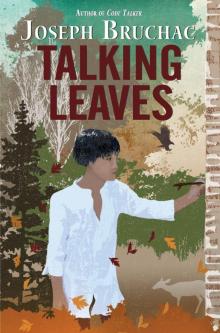 Talking Leaves
Talking Leaves Found
Found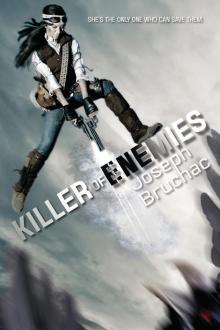 Killer of Enemies
Killer of Enemies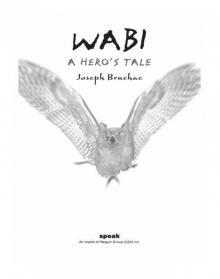 Wabi
Wabi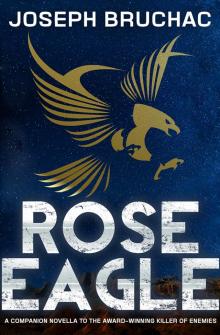 Rose Eagle
Rose Eagle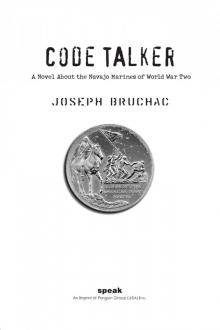 Code Talker
Code Talker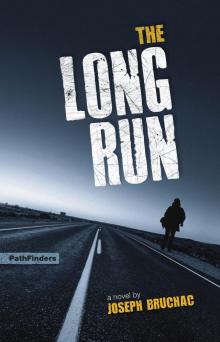 The Long Run
The Long Run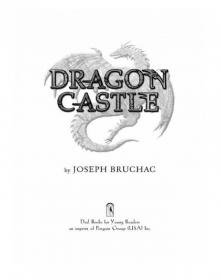 Dragon Castle
Dragon Castle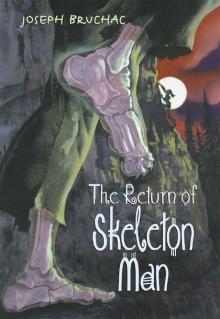 The Return of Skeleton Man
The Return of Skeleton Man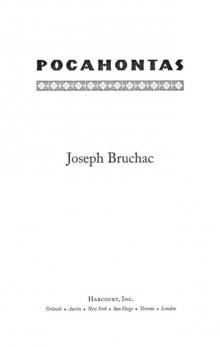 Pocahontas
Pocahontas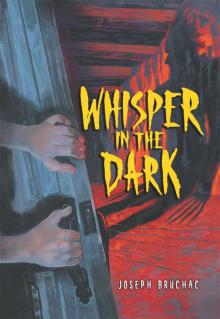 Whisper in the Dark
Whisper in the Dark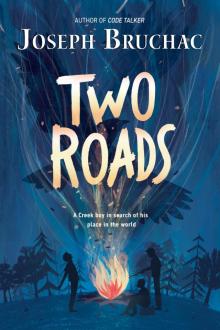 Two Roads
Two Roads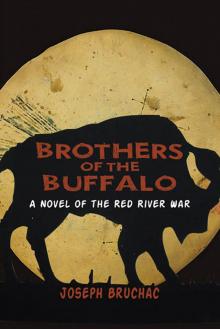 Brothers of the Buffalo
Brothers of the Buffalo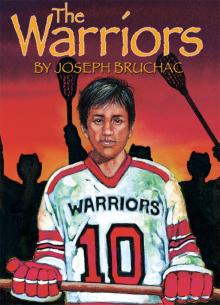 The Warriors
The Warriors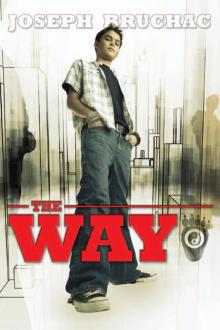 The Way
The Way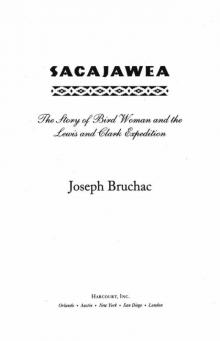 Sacajawea
Sacajawea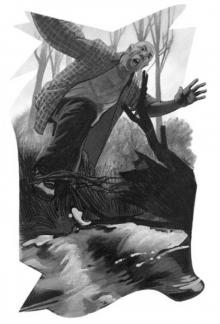 Night Wings
Night Wings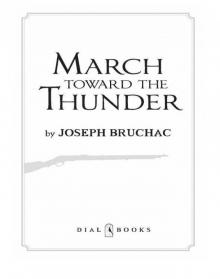 March Toward the Thunder
March Toward the Thunder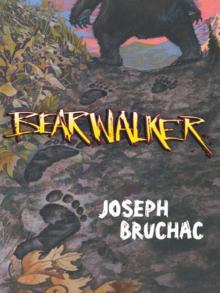 Bearwalker
Bearwalker Skeleton Man
Skeleton Man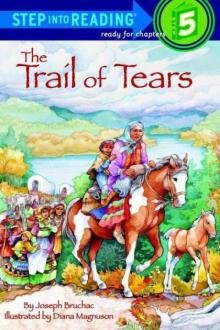 The Trail of Tears
The Trail of Tears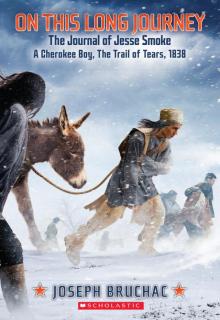 On This Long Journey
On This Long Journey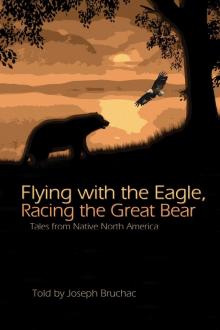 Flying with the Eagle, Racing the Great Bear
Flying with the Eagle, Racing the Great Bear